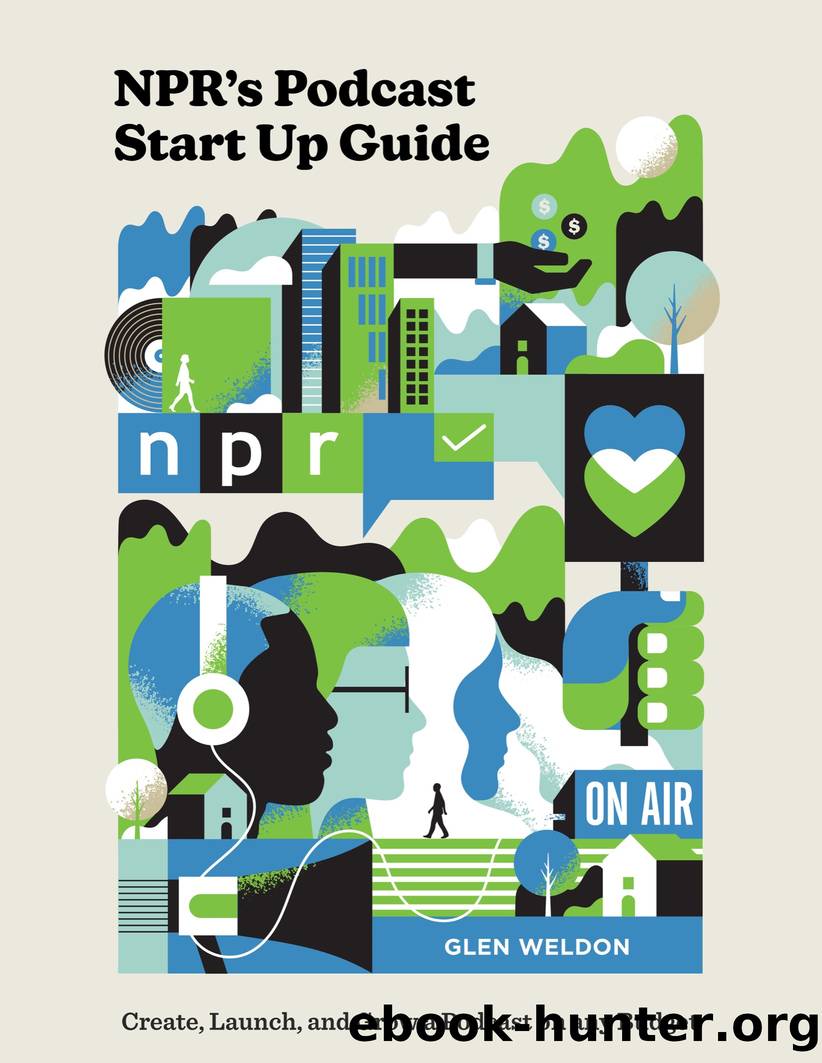NPR's Podcast Start Up Guide by Glen Weldon

Author:Glen Weldon [Weldon, Glen]
Language: eng
Format: epub
Published: 2021-06-29T00:00:00+00:00
Booking and Planning the Interview
If youâre satisfied with the preinterview and would like to set up the formal interview, let them know that youâd like to book an interview and, if they agree, move into planning-the-actual-interview mode.
Put the person at ease about the process. For starters, get their name right. Ask for pronunciation if you arenât sure. Jot it down in a way thatâll help you remember. Ask for any professional title or other identifier they want used, as well as their preferred gender pronoun. This is part of accurate reporting and respecting your interviewee for their time and contribution.
If appropriate to your show, ask guests for a bio that you can draw on to introduce them; that way, you both know the information will be accurate. Also if appropriate, ask for info on where listeners can find their latest film, book, album, and the like.
Sometimes people get all tangled up about taping an interview and start sounding stilted and unnatural. Or they spout jargon (because they think they âshouldâ or maybe itâs just how they talk). Your job: Angle them toward what would help your audience understand what they have to say. As All Things Considered editor Jessica Deahl writes: âI often tell prospective guests to imagine theyâre explaining the subject at hand to a really smart high school student.â
If you book the interview, plan together where and how itâll happen. Scope out the technical side: Could you both be in a studio (ideal, but rare)? Use a recording app? If a phoner, how good is the sound? If an internet platform, howâs their connection? If on location, talk about a recording space (see chapter 9). Make time to record active sound if needed, and kick around ideasâwhat sounds would be associated with this personâs world? Add them to your sound list.
Some podcasts pay interviewees for their time. Itâs NPR policy not to pay those we interview for news or featuresâbut on PCHH, for example, we do pay guests or âfourth chairs,â those we invite to the table to take advantage of their expertise. Generally (very generally) speaking, the difference is whether the person youâre interviewing is considered a source (no pay) or a contributor (small fee).
Try to get everything you need in that interview session. That way, the active and ambient sounds associated with that intervieweeâs voice will be consistent in the final piece, creating an easier editing job for you and a more seamless listening experience for your audience. If you need more tape and canât return to the location, make sure your script signposts to your audience that this professional fisherman youâd interviewed aboard his boat is now talking to you by phoneânary a splash to be heard: âWe wondered.⦠So we called Joe Jenkins on one of his rare days off to find out.â
Allow more time than you think youâll need. Sami Yenigun, supervising editor for All Things Considered, helped start the podcast Whatâs Good with Stretch & Bobbito as a producer. âFor a half-hour show,â he says, âwe might record a two-hour-long interview or an hour and a half, maybe.
Download
This site does not store any files on its server. We only index and link to content provided by other sites. Please contact the content providers to delete copyright contents if any and email us, we'll remove relevant links or contents immediately.
Call Me by Your Name by André Aciman(18967)
Ready Player One by Cline Ernest(12839)
How to Be a Bawse: A Guide to Conquering Life by Lilly Singh(6693)
Wiseguy by Nicholas Pileggi(4586)
The Kite Runner by Khaled Hosseini(4436)
On Writing A Memoir of the Craft by Stephen King(4214)
The Crown by Robert Lacey(4105)
Audition by Ryu Murakami(4099)
Call me by your name by Andre Aciman(4073)
Harry Potter and the Cursed Child: The Journey by Harry Potter Theatrical Productions(3965)
Gerald's Game by Stephen King(3918)
The Perils of Being Moderately Famous by Soha Ali Khan(3783)
Dialogue by Robert McKee(3582)
Dynamic Alignment Through Imagery by Eric Franklin(3489)
Apollo 8 by Jeffrey Kluger(3200)
How to be Champion: My Autobiography by Sarah Millican(3186)
Seriously... I'm Kidding by Ellen DeGeneres(3100)
Darker by E L James(3088)
History of Dance, 2E by Gayle Kassing(3000)
